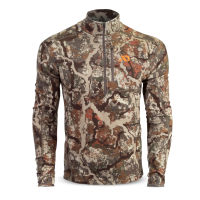Long before the first rays from the October sunrise slanted their way through the forest, I knew there were turkeys roosted all around me. That was exciting, because in addition to a couple of deer tags, I had a fall turkey license in my wallet.
It wasn’t too deep into legal shooting light before I realized I had a problem. With a whole flock roosted in the surrounding trees, getting away with any type of movement was going to be tricky.
As soon as the first couple of birds pitched down, I got ready to draw. Through a chorus of clucks and kee kees, I managed to pick out a hen and shoot right over her back. Another followed her down the trail, and I whiffed again. The third time I shot, I’m not even sure I had my eyes open. I was in full panic mode, with a heavy case of turkey fever.
With two arrows left in my quiver, I watched the flock feed away and almost immediately noticed a deer heading my way. When the little button buck got to 17 yards, I shot him square in the guts. He ended up hopping a few steps and bedding down. With my last arrow, I hit him too far back again. He took off, and I climbed down to go meet up with my dad.
It was a classic emotional roller coaster. I’d shot horribly, but I knew that I was about to tag my second deer. What I didn’t know was that when we walked up on him, he’d still be alive. It was the first time I had to cut a deer’s throat, and it made that long-lost teenage version of myself want to do better.
Let The Bad Feelings Speak
That debacle of a morning happened a couple of decades ago, but I remember it well. It was the first step on a long journey to try to be as good of a shot as I can be. As you probably well know, it’s an admirable goal. It’s also a quest that never really ends.
Hitting and losing a deer sucks, a lot. But we are generally sheltered from the suffering that the experience causes. We see it from our perspective, which is the hope of taking a shot, followed by the crushing reality that another one has slipped through our fingers. It’s a different experience when you find one still alive.
Unless you’re a Patrick Bateman-level psycho, that should leave a mark. No one wants to walk up on a struggling deer to finish it off, but it happens. When it does, it’s probably not going to make you feel great about yourself. The bad feelings plead an interesting case, and you should listen. It’s a good reminder to take the shooting and shot selection parts of what we do very seriously.
There Are No Gray Areas, Personally
The question of ethics comes up all of the time. It’s the old, what do you do when no one is watching, quandary. The thing is, we know what makes us feel good about ourselves, just as we know what makes us feel shitty.
Take an encounter a buddy of mine had on a hunt several years ago in South Dakota. I was tagged out and scouting while he went in to hang a stand on a walk-in ranch. We had dealt with nonstop rain for the whole trip, and it was forecasted to get worse.
This meant that legal shooting hours extended deep into the twilight. It also meant that blood trailing would be extra challenging due to the impending storms.
As the light faded, a pair of young bucks posed up for him. He shot, and although he didn’t do anything legally wrong, ethically, it wasn’t much of a gray area. And he knew it.
We never found that deer, although I’m certain it died. I’m also certain that that was the last time my buddy would push it in a low-light situation while sitting in the drizzling rain. On paper, that sounds like a no-brainer situation, but it’s not so simple.
When you factor in having a few days out-of-state, the cost of the license, and the trip overall, it’s easier to understand taking a shot when you know you probably shouldn’t. If you haven’t done that yet, keep hunting. You’ll get there.
What these poor decisions do for us is set our moral hunting compass. While ethics is an entire category rooted in gray areas, personally, it doesn’t have to be. You know what decisions make you feel like you did the right thing.
Choices, Choices, Choices
You don’t have to make a bad shot on a buck or take a greedy shot in terrible conditions to mold your ethics in the right direction. As hunters, we should always examine our choices. Some hunters would use every legal technological advantage they could get their hands on, while experiencing zero qualms.
Others just might not feel right about embracing using a crossbow that is rifle-accurate at 100 yards, or a camera that sends instant images to their phone, or waiting over a pile of corn for a hungry buck. Many of the legal methods of hunting, and much of the legal equipment, might cross a certain line.
In this realm, sometimes you just know that certain things aren’t for you. With others, you might have to try them out to know for sure. Either way, what happens during your hunts and how you feel about them, informs your future self. Listen to what that person says because he’s leading you along a better path as a hunter.
For more deer hunting info, check out these articles: How to Identify the Core Areas of Mature Bucks, What Deadheads Teach Whitetail Hunters About Buck Behavior, and Hunting One Target Buck Can Ruin Your Whole Whitetail Season.




Conversation